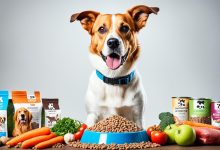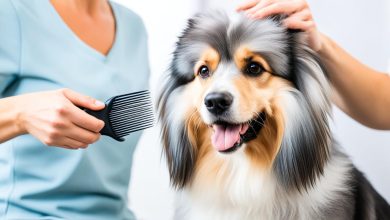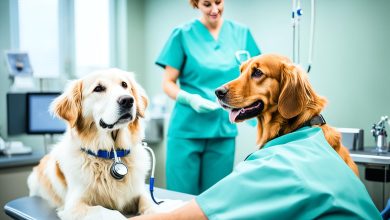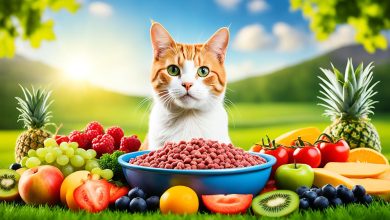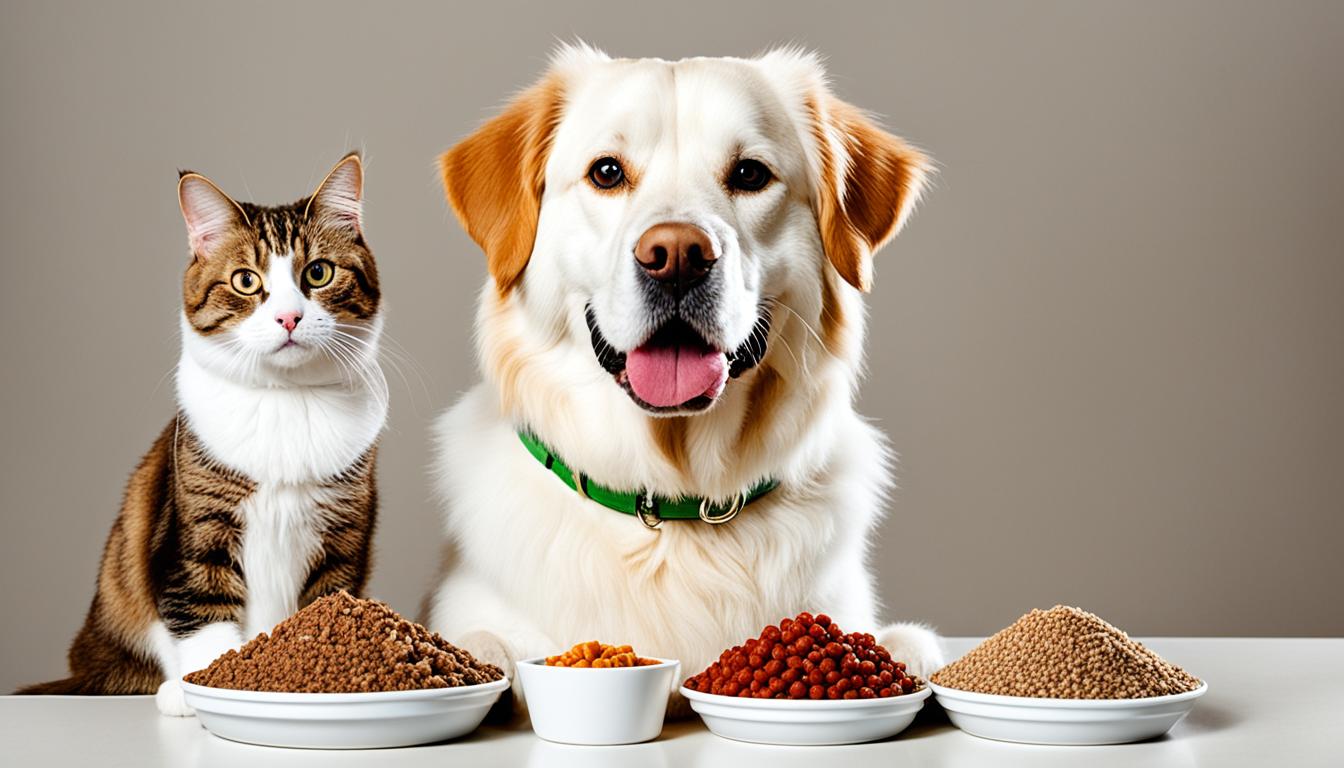
We all want our pets to be healthy and happy, which starts with what they eat. A balanced diet keeps dogs and cats in top shape. Knowing what goes into their meals helps us pick the best food for them.
Dogs and cats need a mix of important nutrients to do well. They need water, proteins, fats, carbohydrates, minerals, and vitamins. Each nutrient has a special job in keeping them healthy and active.
Key Takeaways:
- A balanced diet is crucial for the health and well-being of dogs and cats.
- Essential nutrients for pets include water, proteins, fats, carbohydrates, minerals, and vitamins.
- The nutritional needs of dogs and cats vary based on factors such as age, size, breed, and health.
- Proteins are important for muscle mass, tissue health, and a strong immune system.
- Carbohydrates provide energy and support the immune system.
Choosing the Right Food for Your Pet
Making the right food choice is key to your pet’s health and happiness. You should consider the ingredients and nutritional value. This ensures they get everything needed for a good life.
It’s vital to pick pet food with high-quality animal proteins. Look for meat as the top ingredient. It gives them the right amino acids and nutrients.
Also, focus on the carbs in the food. Choose non-GMO options without added sugars. They should also have a low glycemic index for energy and health.
Don’t forget about healthy fats. Options like fish oils and flaxseed oil are rich in omega-3s. They help improve skin and coat, while also promoting overall health.
Make sure the pet food has a balanced mix of vitamins and minerals. These are key for body functions. They mean your pet’s diet is complete.
Be careful not to overfeed your pet as it can lead to health problems. Talk to a vet about the right amount of food. They will help set a feeding schedule based on your pet’s needs.
Remember, water is just as important as food. Always provide fresh, clean water. This keeps your pet hydrated and healthy.
| Canine and Feline Diet | Proper Pet Diet | Animal Diet Guidelines |
|---|---|---|
| Prioritize high-quality animal-based proteins | Avoid overfeeding | Consult with a veterinarian |
| Choose non-GMO carbohydrates | Ensure balanced mix of vitamins and minerals | Provide fresh water at all times |
| Include healthy fats | ||
Meeting Your Pet’s Nutritional Needs
Pets need the right balance of nutrients, just like we do. Watch your pet for signs they might not be getting what they need. Things like eating their poop or licking a lot could mean they’re missing key nutrients.
Working with a vet is key to meet your pet’s food needs. They can suggest the best food based on your pet’s age, breed, and health. This helps make sure your pet is as healthy as can be.
Sometimes, pets need extra vitamins and minerals. Pet food supplements can fill in those gaps. But, always talk to a vet before adding supplements to your pet’s meals.
Kittens and puppies need more energy and nutrients than grown-up pets do. They should eat more often during the day. A vet can tell you how much and how often to feed them. This makes sure they grow up strong and healthy.
Don’t forget, staying active is just as important as eating right for your pet. Play and exercise with your pet to keep them fit and happy. It’s good for both of you.
FAQ
What are the essential nutrients for a balanced diet for dogs and cats?
Why are proteins important in a pet’s diet?
What role do carbohydrates play in a pet’s diet?
How do fats contribute to a pet’s diet?
What is the role of vitamins and minerals in a pet’s diet?
Why is water essential in a pet’s diet?
What should I consider when selecting pet food?
How much should I feed my pet?
Can my pet have specific nutrient imbalances?
Are supplements necessary for a pet’s diet?
How often should I feed my puppy or kitten?
Is exercise important for my pet’s overall health?
Source Links
- https://www.webmd.com/pets/dog-cat-nutrition
- https://www.centralpetaz.com/blog/a-basic-guide-to-nutrition-for-dogs-and-cats
- https://vetnutrition.tufts.edu/2023/05/what-nutrients-are-essential-for-my-pet/
